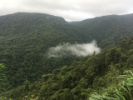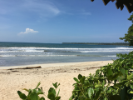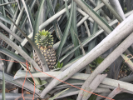Two CSEE professors participate in program to encourage more UB students to study abroad
Photos taken by Atkinson and Jensen during the Incubator
By Peter Murphy
Published July 11, 2017 This content is archived.
Last month, two professors in the Department of Civil, Structural and Environmental Engineering traveled to Costa Rica as part of a Study Abroad Incubator.
Professors Jim Jensen and John Atkinson, both environmental engineering faculty members, were selected by UB’s Office of International Education to participate in the office’s first-ever study abroad incubator – a program for faculty and staff interested in designing and leading new study abroad initiatives.
“We decided to pick a group of applicants who had a strong desire to advance global learning in their respective departments at UB,” said Trevor Poag, director of global learning opportunities. “This was a non-traditional workshop with hands-on experience. Our team was able to see Costa Rica first-hand and look at different ways to connect students to all it has to offer in terms of experiential learning opportunities.”
Seven units at UB were represented on this trip. In addition to Jensen and Atkinson from the School of Engineering and Applied Sciences, one person from each of the following units participated: the School of Nursing, Jacobs School of Medicine and Biomedical Sciences, Graduate School of Education, College of Arts and Sciences, Community for Global Health Equity and the School of Management.
Jensen leveraged his broad perspective in submitting his application to participate in the incubator. “As part of my role in the UB Academies, I encourage a broad range of students to participate in study abroad programs, not just civil and environmental engineering students,” he said.
Jensen’s research on water in the developing world was also a component of his application to the incubator.
“Jim (Jensen) and I both went, and neither knew the other was going,” said Atkinson. His application focused more directly on his research interests, which include air pollution control, environmental and water resources engineering, and more specifically, sustainability.
“Costa Rica is fascinating,” said Atkinson. “They are highly ranked in global sustainability surveys. Almost 98% of their electricity is from renewable sources. Over 25% of their land is protected forests.”
The group, led by Poag, stayed in Costa Rica from June 5-9, 2017. They traveled around the country, visiting different sites, including a government-run healthcare services center; the Institute for Central American Development Studies; a public school; the Association of Costa Rican Engineers and Architects; coffee, pineapple and banana plantations; the Kekoldi indigenous community; the Quetzal Education Research Center; and hydro and wind energy generation sites.
“Based on my experience living there for a number of years, I was able to select a few key sites to illustrate the topics that were present in the study abroad incubator. This was a place to sharpen some ideas and spur ideas for new development. The idea now is to try to advance some of the great ideas our team brought to the table,” said Poag.
Only 80 students from the School of Engineering and Applied Sciences reported studying abroad the last time this data was collected during the fall 2016 semester, reflecting the overall trend of low participation rates of engineering students in study abroad programs.
“Engineers study abroad at a very low rate compared to other majors,” said Jensen, who is also the director of undergraduate studies for the environmental engineering program. “Engineering requires cultural sensitivity. It requires you to know about people, and how people from other cultures think. A twenty-first century engineer needs to spend time abroad so they can bring a more global perspective into their decision making.”
Jensen and Atkinson each have experience working abroad, but neither studied engineering abroad as an undergraduate student. Atkinson, like Jensen, sees the importance of study abroad programs, and the impact on our students.
“The cultural experience is very important,” said Atkinson. “The experience of observing how different people do things, of relating to people from other cultures, and of identifying similarities and differences changes the way you think and act. Even if you never step foot abroad again, it will make you a better engineer - a more complete, well-rounded and thoughtful professional.”
Both CSEE professors are developing ways to maximize the study abroad opportunities available to students, not only in the department, but in the School of Engineering and Applied Sciences.
JOIN OUR MAILING LIST
Sign up to receive UB CSEE's electronic newsletter, delivered to your inbox!
Companies will be on campus regularly this semester to discuss engineering opportunities and share information applicable to all students.
View the seminar speaker schedule here






